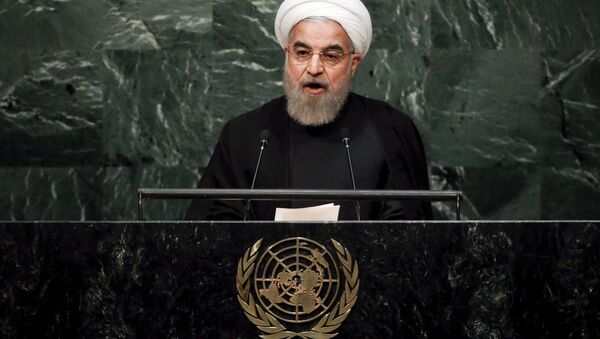According to the deputy managing director of the national Iranian oil company (NIOC) Ali Kardor, systematic tax collection in Iran followed the president's decision to change the country's economic policy from being dependent on oil to taxation revenues due to falling oil prices which did a number on Iran's economy.
"For the first time in 50 years, the government's share of the oil revenue is less than what it is earning from tax, including VAT," the Guardian cited Kardor as saying on the sidelines of the second Europe-Iran forum in Geneva.
"Only around 10 percent of Iran's GDP is currently dependent on oil", Kardor said.
The Islamic Republic of Iran, as the second largest economy in the Middle East, has a sovereign wealth fund, 20% of which consists of income from oil.
However, according to the World Bank, aggregate GDP and state revenues still depend to a large extent on oil revenues and are therefore intrinsically volatile.
The West had long accused Tehran of hiding nuclear weapons development under the guise of a peaceful nuclear energy program. Anti-Iran sanctions imposed by the United States and the European Union banned sales of Iranian oil to the European Union and some parts of Asia.
President Rouhani Criticizes Oil Dependency, Former Gov't Economic Policies pic.twitter.com/6EvsyLL05p
— ASM.General Trade (@ASMTrade) September 15, 2015
January 2016 could mark the time, according to Rouhani, when the UN will examine whether the measures to cut back uranium enrichment has been taken by the Islamic Republic or not and, if the case, the western countries are obliged to gradually lift sanctions against Iran and resume exports and frozen energy projects.
"We currently produce 3m barrels of oil a day, of which 1.3m are exported but we expect that to increase to 2.3m in May or June next year," Kardor said.
Foreign direct investments are expected to flow in the country as NIOC is going to offer new beneficial contracts by November at a price exceeding $100 billion (£66 billion), for about 45 potential onshore and offshore drills.
Tehran has recently taken significant measures to reconsider its reliance on crude oil and moved toward tax policies to get revenues from, claims Hossein Rasam, the director of Rastah Idealogistics and former Iran adviser to FCO.
"Under advice from the IMF, Iran began to redefine taxation in the early 1990s, but genuine efforts only started under the reformist president Mohammad Khatami and continued under Mahmoud Ahmadinejad, when VAT was first introduced," he said.
"Bearing fruit just now, Iran is pursuing tax collection more seriously and putting itself in order to rely more on taxation," Rasam added.
There has been nothing but a mutual and beneficial effect to switch economic strategies not only for the government, but for Iran's citizens as well.
"This is a positive development for Iran, for the more tax people pay, the more accountability and responsibility they will demand from the government."
That's not the first time in history taxes contributed to the country's economy as by early 1938, Iran, ruled by Reza Shah Pahlavi, managed to complete the Trans-Iranian Railroad construction linking the Persian Gulf to the Caspian Sea, thanks to sugar and tea taxes.
Amir Ali Handjani, an Iranian-American energy executive, said Iran was eager to put into life the nuclear deal considerably faster in order to show its readiness for doing business with international partners.
"We are in an unstable period," he said. "European firms will have to be sensitive in pursuing business in Iran with great caution. Europeans will be the biggest benefactor, let's not forget EU was Iran's largest trading partner a decade ago and there is no reason why they can't do the same now."
Iran will unveil its newest oil contracts, clinched after the signing of the historic deal on its nuclear program, at a conference in Tehran, tentatively scheduled for November, Ali Kardor said earlier.



